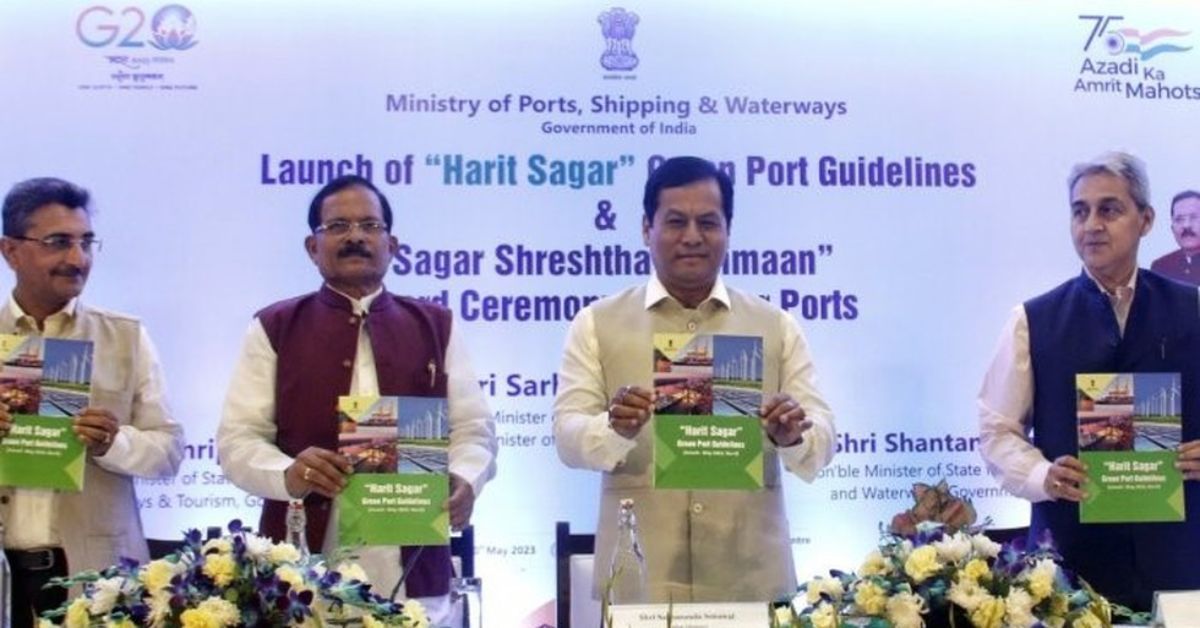Minister of Ports, Shipping & Waterways, (MoPSW), Sarbananda Sonowal launched ‘Harit Sagar’ the Green Port Guidelines 2023 on 10th May at the India International Centre, New Delhi. The ‘Harit Sagar Guidelines 2023’ envisages ecosystem dynamics in port development, operation, and maintenance. It was in accordance with the ‘Panchamrit’ commitments enunciated by Prime Minister Modi, at the 26th session of the Conference of the Parties (COP26) to the United Nations Framework Convention on Climate Change (UNFCCC) held in Glasgow, United Kingdom.
The five nectar elements (Panchamrit) of India’s climate action are:
1. Reach 500GWNon-fossil energy capacity by 2030.
2. 50 per cent of its energy requirements from renewable energy by 2030.
3. Reduction of total projected carbon emissions by one billion tonnes from now to 2030.
4. Reduction of the carbon intensity of the economy by 45 per cent by 2030, over 2005 levels.
5. Achieving the target of net zero emissions by 2070.
Ports have been undertaking green initiatives and were actively contributing to the fulfilment of the ‘Panchamrit’ commitments. The Harit Sagar Guidelines – 2023 lays emphasis on use of Clean / Green energy in Port operation, developing Port capabilities for storage, handling and bunkering Greener Fuels viz. Green Hydrogen, Green Ammonia, Green Methanol / Ethanol etc.
Joint Secretary Ports Sushil Kumar Singh said that “these steps were going to prove to be a big step in our journey towards decarbonizing the port sector.” The ports he said were expected to align their strategies with these sustainability goals and to incorporate them in their day-to-day operations.
The objective of guidelines was to minimize waste through reduction, reuse, repurpose and recycle in order to attain zero waste discharge from port operations and promote monitoring, based on Environmental Performance Indicators (EPI). It also encompassed other aspects of National Green Hydrogen Mission pertaining to ports, such as development of green hydrogen facilities, LNG bunkering, Offshore Wind Energy etc and provides provision for adopting global Green Reporting Initiative (GRI) standard.
He further added that the major ports have taken several initiatives, but the efforts have been largely fragmented. However due to lack of standard protocol, there was no coordinated action to capture the action points of the mission document. The ministry has tried to fill up this gap by introducing Green Port Guidelines. These guidelines were only advisory in nature that would give the ports the freedom and flexibility to design their own strategies and implement methodologies to achieve their goals.
Sudhansh Pant, Secretary, MoPSW said that for the first-time environmental key performance indicators (KPIs) have been established for the ports. By this, the ports can be aware of the requirements for environmental protection and where they stand. He further stated that the four major ports Deendayal Port, Visakhapatnam Port, New Mangalore Port and VOC Port were already generating more renewable energy than their demand. He further added, “from now onwards our ports will be able to evaluate themselves on the environmental indicators to know their capability in the environmental aspects.” The ports that adopt green standards would be given incentives, in terms of various concessions, he added.
Further the Harit Sagar gives detailed guidelines on matters such as waste management, effluent discharge etc. The guidelines are also applicable for non-major ports.
Rajiv Jalota, Chairman, Indian Ports Association (IPA), said that the guidance relating to technical operations would be provided by them. They have established a green port task force comprising personnel from the industry and the Government, to provide critical inputs. India, he said, was also a partner in the QUAD shipping task force, along with Japan, USA and Australia. They have had several deliberations for establishing green corridors. The Harit Sagar guidelines also focussed on green corridors which would serve as an important guideline for the development of the corridor.
‘Sagar Shreshtha Samman’ awards
The occasion was also used to confer the ‘Sagar Shreshtha Samman’ awards to major ports for their exceptional achievements in various operational parameters FY – 2022-23. Ports having registered highest incremental improvements were also honoured and they were ranked on the basis of their overall performance during 2022-23. The idea was to generate fair and healthy competition amongst the Major ports. Sonowal had emphasized that healthy competition among the ports was essential for progress and improvement.
The award for the best Absolute Performance for the year 2022-23 was conferred to Deendayal Port; Kandla for handling highest cargo of 137.56 MMT. The Jawaharlal Nehru Port received an award for achieving a major milestone in turnaround time. Paradip Port received the award for ship berth day output. Kamarajar Port was recognized for improvement in pre-berthing detention time. Cochin Port received the performance shield for the best turnaround-time for a non-containerised port.
Paradip Port bagged the award for best incremental performance by attaining the highest cargo growth rate of 16.56%. Mormugao Port also received the award for best ship berth day output and Kamarajar Port received the award for best pre-berthing detention time.
The coveted award for the best port was conferred to Paradip Port for overall annual performance based on several parameters such as cargo handling, average turnaround time, ship birthday output, idle time at berth, operating ratio and pre berthing detention.







